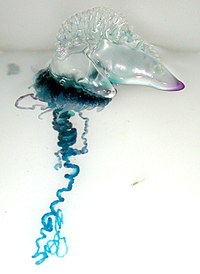
Photo from wikipedia
As key participants in tourism activities, the tourists have an important role in the carbon emissions. Therefore, it is essential to identify the key elements that can arouse consumers’ low-carbon… Click to show full abstract
As key participants in tourism activities, the tourists have an important role in the carbon emissions. Therefore, it is essential to identify the key elements that can arouse consumers’ low-carbon tourism behavioral intention; this has become an important topic for the academic community. However, to the best of my knowledge, most studies have explored the process of formation of consumers’ low-carbon tourism behavioral intention from the cognitive or emotional perspective, and have seldom paid attention to the communication perspective. As a result, the interpretation and prediction of consumers’ low-carbon tourism behavioral intention is limited. Based on the framework of communicative ecology theory (CET) and stimulus-organism-response theory (SOR), our study constructs an integrated model of the relationship between environment-friendly short video experience and consumers’ low-carbon tourism behavioral intention at the technological, content and social levels, introduces emotional elements such as empathy with nature and perceived environmental responsibility. Structural equation model and bootstrap method were employed for analyzing the data. Results revealed that the presence and perception of environmental education are the cognitive factors that impact consumers’ low-carbon tourism behavioral intention; these can effectively stimulate consumers’ low-carbon tourism behavioral intention. Empathy with nature and perceived environmental responsibility are the emotional factors that impact consumers’ low-carbon tourism behavior; they play significant mediating roles between environment-friendly short video experience (presence, perception of environmental education, online interaction) and consumers’ low-carbon tourism behavioral intention. On the one hand, the research conclusions enrich the perspective and content of the research on consumers’ low-carbon tourism behavioral intention and its influencing mechanism; on the other hand, they acquaint with the practical significance of implementing environmental education via the emerging communication modes such as short videos, improve consumers’ awareness of their environmental responsibility, and promote environmental governance and sustainable development of tourist destinations.
Journal Title: Frontiers in Psychology
Year Published: 2023
Link to full text (if available)
Share on Social Media: Sign Up to like & get
recommendations!